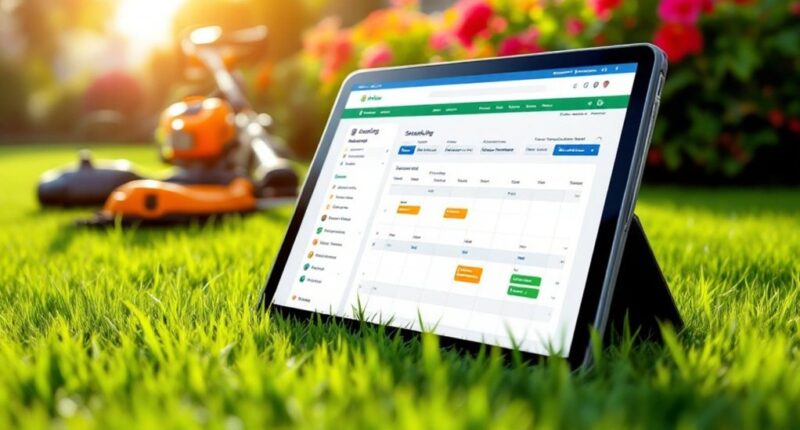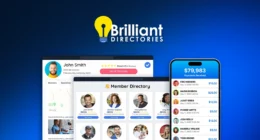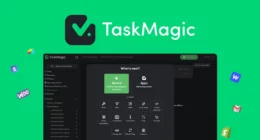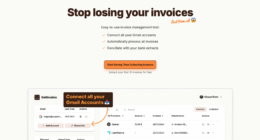Lawn care software helps small businesses automate daily operations and boost efficiency. Popular solutions like Jobber ($49/month) and Yardbook (free version available) offer essential features including scheduling, GPS tracking, and client management. These digital tools can reduce scheduling time by 75% while cutting fuel costs up to 30% through route optimization. Small companies typically start with user-friendly platforms like Yardbook before scaling up to more robust solutions as their operations expand. Understanding the full range of features and pricing options reveals the best path forward.
Quick Overview
- Yardbook offers a free basic version ideal for small lawn care businesses just starting with software management tools.
- Essential features include scheduling, GPS tracking, customer database management, and automated invoicing capabilities.
- Small businesses can reduce planning time by 75% and cut fuel costs up to 30% with scheduling automation.
- Mobile app access allows real-time updates and improves on-site productivity by 32% for small field teams.
- Entry-level software like Jobber starts at $49 monthly, providing core features suitable for small business operations.
Essential Features to Look for in Lawn Care Software

When selecting lawn care software for a business, understanding the essential features can make the difference between streamlined operations and daily frustrations. Core functionalities should include robust scheduling tools with automated job assignments and GPS tracking for field teams.
Key features to prioritize:
- Extensive scheduling system with drag-and-drop capabilities
- Mobile app access for real-time updates and job management
- Customer database with service history tracking
- Automated invoicing and payment processing
- Route optimization for efficient service delivery
The software should also offer essential reporting tools to monitor business performance and team productivity. Professional software solutions like Jobber enable businesses to send on-my-way texts to customers, keeping them informed about service timing.
Look for solutions that provide offline functionality for areas with poor connectivity and seamless integration with accounting software. These features guarantee smooth operations while maintaining accurate records of all service activities.
Top Software Solutions and Their Price Points
Several leading lawn care software solutions compete in today’s market, each offering distinct features and pricing structures to meet diverse business needs.
Among the top contenders, Jobber offers extensive features starting at $49 monthly for its Core plan, while Service Autopilot begins at $47 monthly with advanced automation capabilities.
Leading software solutions Jobber and Service Autopilot provide robust feature sets at competitive monthly rates under $50.
For budget-conscious businesses, Yardbook provides a free basic version with optional paid-ons. LawnPro, though pricing isn’t publicly disclosed, offers industry-specific tools and a free trial period. RealGreen takes a custom approach, tailoring prices to individual business requirements.
WorkWave delivers comprehensive service management tools with cutting-edge technology integration at approximately $79 per month.
When comparing options, businesses should consider:
- Monthly budget constraints
- Required features and scalability
- Integration needs
- Mobile app requirements
- Available customer support
Each solution provides unique benefits, making careful comparison essential for selecting the right fit.
How Software Implementation Boosts Business Growth

Modern lawn care businesses transform their operations through strategic software implementation, unblocking powerful growth opportunities and competitive advantages. Software solutions drive growth through multiple channels:
First, automation streamlines daily operations, allowing companies to handle more clients without proportionally increasing staff. Teams complete more jobs per day through optimized scheduling and route planning, directly impacting revenue. Route optimization software maximizes fuel efficiency and minimizes travel time between jobs.
Second, improved customer management leads to higher retention rates and referrals. Centralized data and automated communication keep clients satisfied and engaged.
Finally, data-driven insights enable smarter business decisions. Companies can analyze profitability per service, optimize resource allocation, and identify expansion opportunities. The financial benefits compound through reduced overhead costs, faster payment processing, and more accurate pricing strategies.
This technological foundation positions lawn care businesses for sustainable, long-term growth in competitive markets.
Optimizing Operations With Digital Tools
Digital tools revolutionize lawn care operations by streamlining essential business functions and eliminating manual bottlenecks. These solutions deliver measurable improvements across multiple areas, with automated scheduling reducing planning time by 75% and route optimization cutting fuel costs by up to 30%.
Mobile applications transform field operations, increasing on-site productivity by 32% while eliminating 95% of paperwork through digital forms. Two-way QuickBooks sync enables seamless financial data transfer for more accurate accounting and reporting. Modern field service platforms offer real-time tracking capabilities to monitor technician locations and job progress.
Digital solutions drive efficiency in lawn care operations, boosting productivity and replacing traditional paperwork with streamlined mobile forms.
Equipment management becomes more efficient with QR code scanning, speeding up check-in/out processes by 75%. Financial operations see significant gains through automated invoicing, which cuts billing time in half and reduces errors by 90% when integrated with accounting software.
Customer relationship management tools enhance service delivery, with centralized data improving response times by 40% and automated follow-ups increasing estimate acceptance rates by 25%.
Selecting the Right Platform for Your Lawn Care Company

Building on the proven benefits of digital solutions, choosing an appropriate software platform represents a defining decision for lawn care companies. Business owners must evaluate their specific needs, budget constraints, and growth plans before selecting a platform that aligns with their operations. In-depth research of ratings and reviews helps validate software choices before making a commitment.
- Small businesses might start with user-friendly options like Yardbook, which offers essential features at no cost while providing room for expansion.
- Growing companies often benefit from thorough solutions like Jobber or LawnPro, which include robust scheduling and customer management tools.
- Large operations typically require advanced platforms like Service Autopilot, featuring extensive automation capabilities.
- Companies prioritizing field operations should consider mobile-first solutions like Housecall Pro, ensuring seamless communication between office and crews.
Success hinges on careful evaluation of key features, implementation planning, and proper staff training.
Frequently Asked Questions
How Long Does It Take Staff to Learn New Lawn Care Software?
Staff learning time for new software typically varies between a few hours to several weeks, depending on multiple factors.
Basic features like time tracking can be mastered in 1-2 days, while complex functions may require 2-4 weeks. The learning curve depends heavily on staff’s tech-savviness, software complexity, and available training resources.
Most teams see full productivity within 30-60 days, with cloud-based solutions generally being faster to learn than on-premise options.
Can Lawn Care Software Work Without Internet Connectivity in the Field?
Yes, most modern lawn care software offers robust offline functionality.
Field teams can access essential features like schedules, client information, and job details without an internet connection. The software automatically syncs data when connectivity is restored.
Key functions including time tracking, GPS logging, and digital forms remain operational offline. This capability guarantees uninterrupted work in areas with poor reception, while maintaining data accuracy across all devices.
What Happens to My Business Data if the Software Company Closes Down?
When it comes to protecting your lawn care business data, you don’t want to put all your eggs in one basket. While software company closures are rare, being prepared for such scenarios is essential for business continuity.
Let’s explore how you can safeguard your valuable business information and what typically happens to your data if your software provider shuts down.
Understanding Your Data Rights
First and foremost, it’s important to know that you typically retain ownership of your business data**. Most software contracts explicitly state this, giving you the right to access and export your information. However, the practical aspects** of retrieving your data can vary depending on your provider’s policies and the circumstances of their closure.
Protective Measures Already in Place
Many lawn care software companies have established safeguards to protect customer data:
- Data retention policies that keep your information accessible for a specified period
- Regular backup systems that maintain data integrity
- Export capabilities that allow you to download your business information
- Data escrow services that provide additional protection
- Contractual obligations that guarantee data accessibility
Taking Proactive Steps
To protect your business interests, consider these essential practices:
- Regular Data Backups: Download and store your business data locally or in a separate cloud storage solution periodically.
- Review Your Contract: Understand the terms regarding data ownership, retention, and access rights.
- Maintain Export Records: Keep updated exports of critical business information in common formats like CSV or Excel.
- Research Alternatives: Have a shortlist of alternative software solutions as part of your contingency planning.
Legal Protections and Guarantees
Your service agreement likely includes provisions for company closure scenarios. Many contracts guarantee:
- A specified period to access and export your data
- Protection of your data ownership rights
- Clear procedures for data retrieval
- Compensation for service interruptions in some cases
Planning for Business Continuity
*Don’t wait for storm clouds to appear* before developing your backup plan.
Consider these strategies:
- Store critical customer information in multiple secure locations
- Document your current software processes for easier change if needed
- Maintain relationships with alternative software providers
- Keep your data organized and properly formatted for potential migration
The Bottom Line
While software company closures can be disruptive, proper preparation can greatly minimize the impact on your business.
By understanding your rights, maintaining regular backups, and having a contingency plan in place, you can confirm your valuable business data remains secure and accessible, regardless of what happens to your software provider.
Remember, the key is not just having access to your data, but being able to quickly resume operations with minimal disruption to your business and customers.
Regular attention to these preparatory measures will help keep your lawn care business running smoothly, come rain or shine.
Are There Seasonal Pricing Options for Months With Lower Business Activity?
Most lawn care software platforms offer flexible seasonal pricing options designed for slower business periods.
Key features typically include:
- Automated winter discounts (15-30% off standard rates)
- Off-peak service packages
- Bundled year-round pricing options
- Dynamic rate adjustments based on demand
Business owners can customize these seasonal rates through their software dashboard, helping maintain steady revenue during quieter months while offering competitive pricing to clients.
The system handles all price adjustments automatically based on pre-set dates.
How Secure Is Customer Payment Information Stored in These Software Systems?
Like a digital fortress, modern payment systems employ multiple layers of robust security.
Customer payment information is protected through industry-standard encryption methods, including SSL/TLS for data transmission and AES-256 for stored data.
The software follows strict PCI DSS compliance requirements, utilizing secure payment gateways like Stripe and Square.
Sensitive data is tokenized, never stored in raw form, and access is restricted through multi-factor authentication and role-based controls.
Regular security audits guarantee ongoing protection.
Conclusion
While yesterday’s lawn care businesses relied on paper schedules and manual processes, today’s successful companies leverage digital solutions to thrive. The right software transforms time-consuming tasks into streamlined operations, letting owners focus on growth rather than paperwork. By carefully evaluating features, costs, and business needs, lawn care professionals can select a platform that cultivates both efficiency and profitability in an increasingly competitive market.








